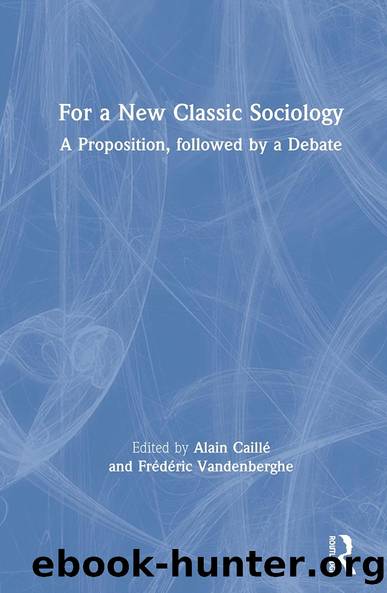For a New Classic Sociology by Alain Caillé Frédéric Vandenberghe

Author:Alain Caillé, Frédéric Vandenberghe [Alain Caillé, Frédéric Vandenberghe]
Language: eng
Format: epub
ISBN: 9780367470739
Amazon: B08GTY12CF
Barnesnoble: B08GTY12CF
Goodreads: 57304023
Publisher: Taylor & Francis
Published: 2020-10-25T00:00:00+00:00
II
One of the liveliest reform movements in the social sciences at present addresses this knowledge-production process in terms of its geopolitics: the movement for decolonization. Students in Britain have asked âWhy is My Curriculum White?â, and students in South Africa insisted âRhodes Must Fallâ. Not just social science students, of course, since the colonial structure of knowledge is found in every discipline of the research-based knowledge formation: in natural science and the humanities, as well as social science. When Ngugi wa Thiongâo wrote Decolonizing the Mind 30 years ago, he was talking explicitly about the politics of language in African literature. Read the IPCC reports and you can see how central the global North is in contemporary climate science.
The point is widely applicable and applies forcibly to us. Sociology was, after all, formed in the centres of global power, addressed the cultural problems of empire at the height of imperial expansion in the late nineteenth century, and has been entangled with an unequal global economy of knowledge ever since. In this economy there is a broad division of labour, in which the practice of theorizing (including the elaboration of methods as well as concepts) is mainly the business of elite institutions of the global North, while the colonized, semi-colonized and post-colonial world serves mainly as a vast data mine.
Alain and Frédéric touch on this matter, rather briefly and dismissively. The post-colonial perspective, they suggest, comes from the humanities and has a sociological deficit. People arguing for it, they say, âbehave like academic backpackersâ, hopping from one intellectual tradition to another to find an undiscovered critical thinker. What we need instead is an anthropologically informed comparative history of civilizations from a cosmopolitan standpoint â inspired by Weber and Durkheim, no less.
Since I cheerfully acknowledge being one of the backpackers, having made some attempt to learn from the wider world, Iâm saddened by this response. The three âundiscoveredâ thinkers from the global South that Alain and Frédéric mention at this point with question marks â Ali Shariati, Hussein Alatas and AnÃbal Quijano â are all well-known sociologists with powerful arguments. If they remain undiscovered by a Eurocentric theoretical tradition, then that tradition really needs to join the twenty-first century.
Alain and Frédéric argue strongly for connecting sociology to philosophy. Do we connect with Paulin Hountondji and Achille Mbembe? Alain and Frédéric argue, rightly I think, that sociology should address problems of politics and economics. Do we learn from Samir Amin and Bina Agarwal? Alain and Frédéric want to extend sociology into the terrain of the Studies, such as gender studies. Do we include the gender theory of Teresita de Barbieri and Dai Jinhua? If the answer to these questions is âyesâ, then we have to acknowledge that the geopolitical attention-span of mainstream sociology in the past has been far too narrow. One of the main tasks of reconstruction is to root out the institutionalized racism of the discipline, and be much more active learners on a world scale.
Learners is the keyword here, and itâs something I want to emphasize.
Download
This site does not store any files on its server. We only index and link to content provided by other sites. Please contact the content providers to delete copyright contents if any and email us, we'll remove relevant links or contents immediately.
Cecilia; Or, Memoirs of an Heiress — Volume 1 by Fanny Burney(32558)
The Great Music City by Andrea Baker(32020)
Cecilia; Or, Memoirs of an Heiress — Volume 2 by Fanny Burney(31956)
Cecilia; Or, Memoirs of an Heiress — Volume 3 by Fanny Burney(31942)
We're Going to Need More Wine by Gabrielle Union(19049)
All the Missing Girls by Megan Miranda(16032)
Pimp by Iceberg Slim(14509)
For the Love of Europe by Rick Steves(14124)
Bombshells: Glamour Girls of a Lifetime by Sullivan Steve(14077)
Talking to Strangers by Malcolm Gladwell(13371)
Norse Mythology by Gaiman Neil(13370)
Fifty Shades Freed by E L James(13243)
Mindhunter: Inside the FBI's Elite Serial Crime Unit by John E. Douglas & Mark Olshaker(9344)
Crazy Rich Asians by Kevin Kwan(9293)
The Lost Art of Listening by Michael P. Nichols(7506)
Enlightenment Now: The Case for Reason, Science, Humanism, and Progress by Steven Pinker(7314)
The Four Agreements by Don Miguel Ruiz(6765)
Bad Blood by John Carreyrou(6623)
Weapons of Math Destruction by Cathy O'Neil(6281)
